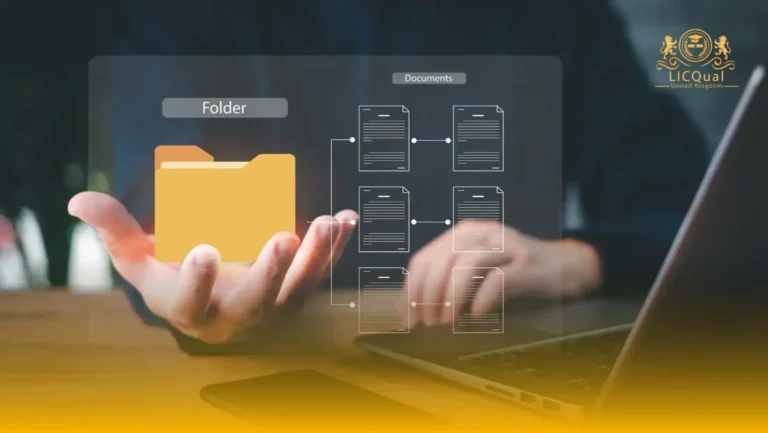The LICQual Level 3 Certificate in Information Systems Development and Society is an advanced program designed for individuals looking to deepen their knowledge of information systems and their impact on modern society. In a world driven by digital transformation, understanding how information systems are designed, implemented, and managed is essential for IT professionals, business leaders, and technology enthusiasts.
This course provides an in-depth exploration of system development methodologies, cybersecurity, data management, and the ethical and societal implications of emerging technologies. By mastering these concepts, you will gain valuable skills to contribute to the efficient and secure management of information systems in various industries.
The LICQual Level 3 Certificate in Information Systems Development and Society covers advanced topics such as system architecture, software engineering principles, database management, and information security. You will explore the role of artificial intelligence, blockchain, cloud computing, and big data in shaping the future of information systems.
With interactive learning modules, real-world case studies, and practical exercises, this course equips you with the skills to analyze technological trends, develop efficient information systems, and apply ethical considerations in digital environments. You will also gain insights into legal frameworks, data protection laws, and cybersecurity strategies essential for safeguarding information assets.
Earn your LICQual Level 3 Certificate in Information Systems Development and Society and position yourself for success in the fast-evolving tech industry.
Course Overview
Qualification Title
LICQual Level 3 Certificate in Information Systems Development and Society
Total Units
6
Total Credits
24
GLH
120
Qualification #
LICQ2200356
Qualification Specification
To enrol in theLICQual Level 3 Certificate in Information Systems Development and Society, candidates must meet the following entry requirements:
- Educational Requirements: Applicants should have a Level 2 qualification in Information Systems, IT, or a related field. Alternatively, individuals with equivalent academic qualifications or relevant foundational knowledge in information systems may also apply.
- Experience: No prior work experience is required; however, basic IT knowledge or familiarity with computers and digital technologies is beneficial. Professionals or students with a background in business, IT, or related fields looking to enhance their expertise will find this course valuable.
- English Language Proficiency: Since the course is delivered in English, applicants must have basic to intermediate English proficiency to understand technical concepts and coursework. Non-native English speakers may need to provide evidence of their English skills through standardized tests or prior education in English.
- Age Requirement: Candidates must be at least 18 years of age at the time of enrolment.
|
Qualification# |
Unit Title |
Credits |
GLH |
|---|---|---|---|
|
LICQ2200356-1 |
Advanced Information Systems Development |
4 |
20 |
|
LICQ2200356-2 |
IT Infrastructure and Cloud Computing |
4 |
20 |
|
LICQ2200356-3 |
Cybersecurity and Ethical Hacking |
4 |
20 |
|
LICQ2200356-4 |
Data Science and Business Intelligence |
4 |
20 |
|
LICQ2200356-5 |
Digital Innovation and Emerging Technologies |
4 |
20 |
|
LICQ2200356-6 |
Ethical and Social Issues in IT |
4 |
20 |
By the end of this course, learners will be able to:
Advanced Information Systems Development
- Understand the principles of modern information systems development and their role in business operations.
- Analyze the system development lifecycle (SDLC) and apply best practices in planning, designing, and implementing IT systems.
- Evaluate the impact of enterprise resource planning (ERP) and business process automation in organizations.
IT Infrastructure and Cloud Computing
- Identify the key components of IT infrastructure, including hardware, software, networks, and virtualization.
- Understand the fundamentals of cloud computing models (IaaS, PaaS, SaaS) and their applications in business.
- Implement cloud security measures to protect data integrity, privacy, and system availability.
Cybersecurity and Ethical Hacking
- Recognize various cyber threats, vulnerabilities, and attack methodologies used by hackers.
- Apply ethical hacking techniques to test and strengthen cybersecurity defenses.
- Understand risk management strategies, encryption techniques, and compliance standards to protect digital assets.
Data Science and Business Intelligence
- Understand the importance of data collection, analysis, and visualization in decision-making.
- Apply business intelligence (BI) tools to extract meaningful insights from structured and unstructured data.
- Explore the role of big data analytics and machine learning in business strategy and innovation.
Digital Innovation and Emerging Technologies
- Analyze the impact of emerging technologies such as AI, blockchain, IoT, and 5G on various industries.
- Understand the role of automation, robotics, and smart systems in enhancing business operations.
- Evaluate the challenges and opportunities presented by digital transformation and disruptive technologies.
Ethical and Social Issues in IT
- Assess the ethical considerations in IT, including privacy, digital rights, and responsible AI development.
- Understand legal and regulatory frameworks, including GDPR, cybersecurity laws, and IT governance policies.
- Evaluate the social and economic impact of technology, ensuring responsible and ethical IT practices.
This diploma is ideal for:
- Individuals seeking to advance their knowledge in information systems development, cybersecurity, and emerging technologies.
- IT professionals looking to enhance their expertise in cloud computing, data science, and business intelligence.
- Students and graduates aiming to build a career in IT infrastructure, cybersecurity, or digital innovation.
- Business owners and entrepreneurs who want to leverage technology, automation, and data-driven decision-making.
- Professionals from non-technical backgrounds who need a deeper understanding of IT systems, cybersecurity, and ethical considerations.
- Individuals interested in ethical hacking, AI, blockchain, and other cutting-edge technologies.
- Anyone looking to stay ahead in the rapidly evolving digital landscape and IT industry.
Assessment and Verification
All units within this qualification are subject to internal assessment by the approved centre and external verification by LICQual. The qualification follows a criterion-referenced assessment approach, ensuring that learners meet all specified learning outcomes.
To achieve a ‘Pass’ in any unit, learners must provide valid, sufficient, and authentic evidence demonstrating their attainment of all learning outcomes and compliance with the prescribed assessment criteria. The Assessor is responsible for evaluating the evidence and determining whether the learner has successfully met the required standards.
Assessors must maintain a clear and comprehensive audit trail, documenting the basis for their assessment decisions to ensure transparency, consistency, and compliance with quality assurance requirements.







